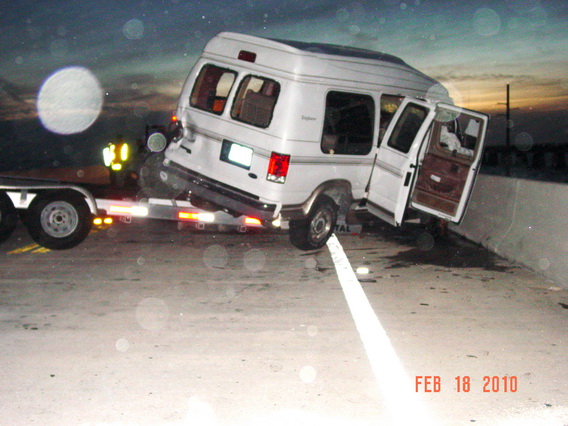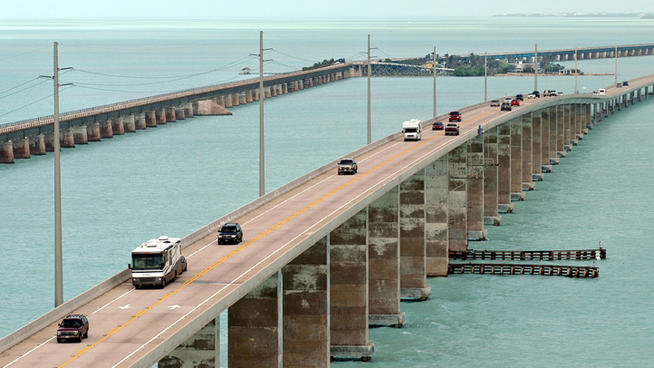February 18, 2010- Florida Fish and Wildlife Conservation Commission (FWCC) employee Elizabeth Overstreet was driving a FWCC truck northbound on U.S. Highway 1 near Marathon, Florida, while towing a trailer and an enormous 31-foot fishing boat. Overstreet was driving at the posted speed limit of 55 mph when she realized that the trailer and boat she was towing began to fishtail from side to side. Overstreet suddenly lost all control of the trailer and boat, which caused the FWCC truck to jackknife directly into oncoming traffic in the middle of the open freeway.
At that time, Ruth was driving her van in the southbound lane with a friend to visit friends and family in Big Pine Key. Suddenly, and without warning, Ruth noticed the FWCC truck barreling directly into her only path on the freeway, and she immediately made a defense maneuver in a desperate attempt to avoid a collision. Unfortunately, there was no escaping the FWCC truck, which ultimately plowed directly into Ruth Ann’s van. The tragic result was a massive head-on collision and explosion with two fatalities and catastrophic injuries to the survivors.
Ruth miraculously survived the collision and ensuing explosion, but her nightmare had just begun. At 5:26 pm, she was loaded onto a stretcher for emergency airlift to Jackson Memorial Trauma unit with nine broken bones and bleeding profusely from numerous lacerations on her face. During this helicopter flight to the trauma unit, Ruth was forced to ponder the gruesome images of her beloved friend’s mangled body which remained lifeless in Ruth’s van.
After the Florida Highway Patrol completed its Traffic Homicide Investigation, it was no wonder at all why Overstreet lost control of the truck and boat on the freeway. FHP concluded that the combined weight of the trailer and boat exceeded the maximum towing capacity of the trailer hitch installed on the FWCC truck by over 4,400 lbs. Specifically, the combined weight of the boat and trailer totaled 10,420, while the maximum towing capacity for the trailer hitch was 6,000 lbs. What’s more, the maximum towing capacity for the FWCC vehicle itself was only 8,000 lbs.
Florida Highway Patrol concluded that Overstreet’s negligent operation of the FWCC truck caused this collision which saw the death of two innocent people and the catastrophic injuries to Ruth.
Leesfield & Partners fought vehemently on Ruth’s behalf behalf. She obtained a result seldom achieved against FWCC, that is a settlement amount above the available insurance coverage (Florida law has adopted a statutory cap for damages in cases involving FWCC’s negligence).
The seven mile bridge
The seven mile bridge in the Florida Keys has been immortalized on television and in big movie productions. The reality is that it contributes greatly to making the roads of Monroe County among the most dangerous and deadliest roads in the entire country. You can find several relevant and eye-opening statistics by reading our previous post here: Lawsuit filed in Key West following rear-end car accident
The seven mile bridge has been the scene of thousands of car accidents and hundreds of fatalities, since it opened in 1982 -The first seven mile bridge was built in 1912.- The head on collision Ruth and her late friend endured was avoidable, like most traffic crashes. But because there are not any guardrails separating northbound and southbound traffic, any driver is at the mercy of the negligence of another. Whether a vehicle passes a slower vehicle, a drunk driver veers in and out of his traffic lane, or someone loses control from texting and driving, there is nothing that an innocent victim can do to avoid the collision. The seven mile bridge has two traveling lanes, and no room on either side of the traveling lanes to escape danger.
That is why the seven mile bridge in Marathon remains one of the most dangerous bridge in the entire country. Less than a month ago, another fatal accident occurred on the bridge, involving two vehicles, one of which caught fire in the collision.
 Key West Injury Lawyer Blog
Key West Injury Lawyer Blog




